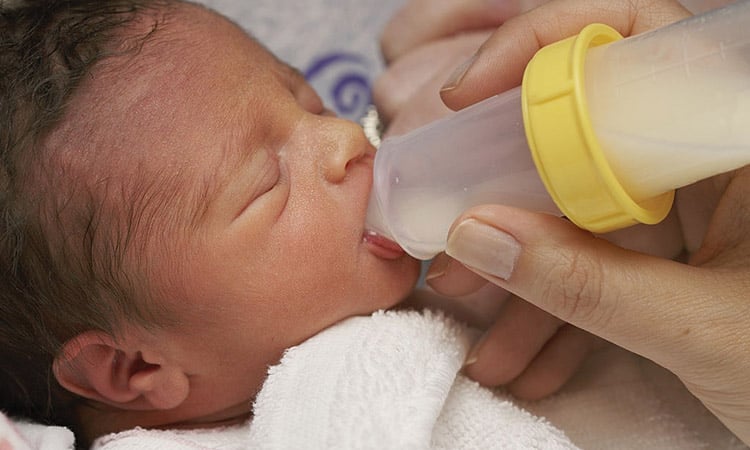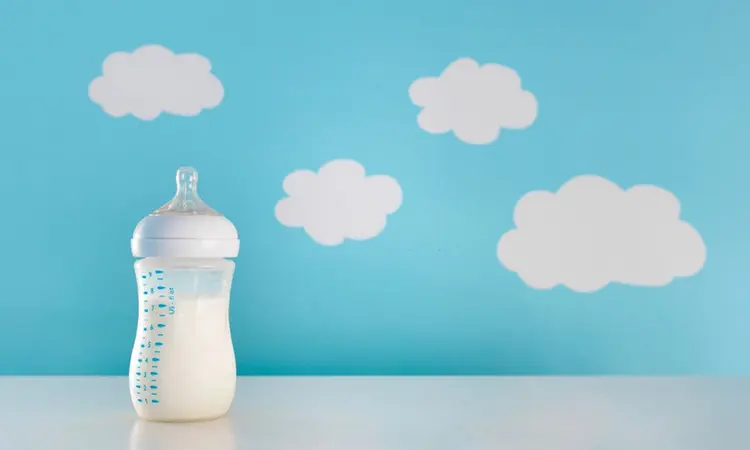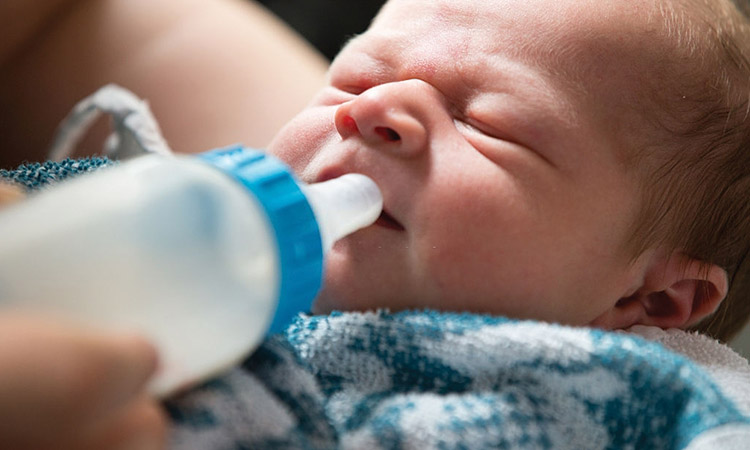Feeding a baby can be challenging, especially, feeding a preterm baby. Feeding a preemie is a milestone that needs to be achieved in the NICU itself, before the discharge- bottle or breast.
Lots of doubts and worries can bother the mother about feeding her preemie. One In this article, we are discussing bottle feeding premature babies-all you need to know.
Unlike the term babies, many issues can interrupt the successful bottle feeding premature babies. Their nutrition needs also differ from the term babies. At times, premature babies are bottle fed to make caregivers are of how much milk are they drinking.

This is because preemies have not been in the womb sufficient time to stock up the nutrients and the skills they need to survive after birth.
Why Bottle-Feeding Premature Babies Is Hard?
Whether it is be bottle-feeding or breastfeeding, it is normal to get anxious when feeding premature babies. For a successful feeding, the baby should have developed three skills that more often lack in preemies. The three skills are:
- Suckling skill
- Swallowing skill
- Skill to coordinate sucking, swallowing, and breathing
The preemies are born earlier these skills are not fully developed in them. This makes feeding scary, frustrating, and tiresome for both babies and mothers. Preemies are generally weak and cannot suck strongly. Also, the muscles in the tongue and jaw that facilitate swallowing will not be fully developed in premature babies.
They also tend to feel sleepy during feedings they sucking is hard work for them. Therefore, premature babies easily get exhausted while trying to suck the milk as they are not strong enough. And as they find it difficult to coordinate sucking, swallowing, and breathing, they tend to choke during the feeding.
Why Premature Baby Have To Bottle Fed?
Even though nothing can replace breastfeeding, preterm babies are recommended being bottle-fed. This is because their nutritional needs differ from that of a term baby.
Related Reading: 6 Things You Will Need For Breastfeeding
Breast milk alone might not be able to satisfy all the nutrition requirements of preemies. Also, more often, premature babies find it difficult to latch on successfully. Therefore bottle feeding premature babies can be a necessity. Sucking through the bottle is less effort for them.
What Are The Supplement Options For Preterm Babies?

The preemies need more nutrition than a full term baby. The nutritional need depends on how premature the baby is and what health issues the baby has. Your doctor will weigh on these things and suggest you supplements. There are different supplement options for preterm babies, such as-
- The extra nutrition needed for the premature baby can be satisfied by adding fortifiers that comes in both liquid and powdered forms to the breast milk. by bottle feeding the breast milk treated with fortifier, the preemies will receive all the extra calories, vitamins, minerals, and protein they need
- If the premature baby is not able to breastfeed the doctor will recommend a preterm formula. Compared to breast milk, these formulas contain higher calories, proteins, minerals, and vitamins that a preemie needs for better growth
- Other than preterm formula, a special formula is also available for premature babies. Doctors recommend these formulae if the pre-mature babies are allergic to milk protein or have trouble absorbing minerals and vitamins from the preterm formula
Related Reading: 13 Health Problems That May Affect Premature Babies
When Do Premature Babies Start Bottle Feeding
We can’t pinpoint a definite time to start bottle feeding premature babies. It depends on several factors. Aspects like how premature the baby is, the health issues the baby contracts due to the preterm birth, and how fast they learn or develop all the three skills mentioned above determines when doing premature babies start bottle feeding.
Those babies born before 27 weeks will be on the ventilator for a period. Their lungs will be underdeveloped and feeding on the bottle will not be able to establish until their lungs are developed, and respiratory issues and other health issues are corrected.
Milk intake of these extreme preterm babies will be by means of tube feeding or gavage feeding (feeding through the nasogastric tube).
Preemies born between 34 to 37 weeks also might have some issues feeding on a bottle as they are not yet mature enough to coordinate sucking, breathing, and swallowing. They will not be able to control the flow of milk from the bottle.
However, a preterm baby who just arrived a week or so early from the due date might not find any difficulty to feed on a bottle.
Despite all these facts, more often, premature babies will be ready to start bottle feeding between 32 and 36 weeks’ gestational age. However, it is the health care team that monitors the preterm baby that decides when the baby is ready to bottle feed.
Is Bottle-Feeding Safe For Premature Babies?
Yes, bottle feeding premature babies is safe if you consider a few things. Also, more often it can be a need as the premature baby will not be able to latch properly. The premature babies drink less milk than a full term baby as their stomach is small.
But, the preemies need to be fed more frequently than full term babies as they tend to dehydrate faster than them. Also, their nutritional needs are higher than a term baby.
Related Reading: 12 Signs Of Low Milk Supply You Should Pay Attention To
For feeding premature babies in NICU, feeding bottles are more useful. This is because bottle feeding not only allows the nurse to understand how much milk the baby is drinking but it also permits the NICU staff to fortify breast milk as per the baby’s need.
Check this out: Chicco Wellbeing Single Pack Pp Bottle 250 ML
By choosing a bottle designed to feed preemies, the process of bottle feeding the premature babies will be easier. Some remarkable features of feeding bottle for premature babies are:
- Soft and flexible nipple. This will help the baby to latch without difficulty
- The extra slow flow nipple gives a baby some control over the milk flow
- Anti-colic valves in the nipple that reduces colic/tummy issues
Best Bottle Feeding Positions For Premature Babies

Bottle feeding a preemie differs in many aspects from a full term baby. They tend to sleep more while being fed. They also find it hard to coordinate swallow and breathe at the same time. Moreover, they will be very weak to be fed continuously for some time.
Here are some bottle feeding positions and tricks to bottle feed the premature baby efficiently.
1. Hold the baby upright while feeding
According to feeding therapists and NICU staffs, a seated up position is one of the optimal feeding positions for a premature baby. This position helps the baby to stay awake throughout the feeding time.
For this, make the baby sit on your lap. Make sure baby’s head and shoulder are well supported by one hand while holding feeding bottle in another.
2. Side-lying position
This is another optimal feeding position advocated by NICU staff for premature babies. For this type of feeding, you have to place the baby on his side. Make sure ears, shoulders and hips come in a straight line.
Raise the head of the baby slightly with the free hand and bottle feed the baby. Make sure the bottle lies parallel to the ground. This position gives the baby more control over the milk flow.
Now let us find some tricks that help in effectively bottle feeding the premature babies:
- Support the chin and cheek as well with the hand that holds the feeding bottle.
- Some oral stimulating exercises will help the baby with bottle feeding. Just simply stroke the bay’s chin, gently circle the lips with your finger and softly squeeze the cheeks before starting the bottle feeding.
- Stop the feeding then and there if the baby has trouble breathing.
How Long Does It Take A Preemie To Learn To Bottle Feed
It all depends on how fast the baby attains the three skills that are needed for successful feeding. This, in turn, depends on how premature the baby is, and the health condition with which the baby is born.
Anyway, as soon as the baby attains suckling and swallowing skills, and able to coordinate sucking, swallowing, and breathing, a preemie can successfully feed on the bottle. This time, however, differs from preemies to preemies.
How Much Milk Should A Premature Baby Drink?

While bottle feeding premature babies, the quantity of milk a premature baby drinks depends on several factors. And it varies with babies. When the preemie gets discharged from the hospital the NICU team will provide you a feeding plan for bottle feeding premature babies.
The feeding plan provides the amount of milk the baby needs to attain adequate growth and weight gain. Most premature babies require around 100 to 120 calories per kg of their weight per day. However, some will require up to 160 to 180 calories per kg as well.
Related Reading: 9 Scientifically Proven Benefits Of Baby Massage
A premature baby requires 120 to 180 milliliters of milk per kilogram per day. The baby should be feed at least every three hours. Some babies need more frequent feeding as they have only a small amount of milk per feeding.
After discharging the pediatrician closely monitors the weight closely and makes necessary changes in frequency or amount of feeding if necessary. By counting the wet diapers and stools, the parents can understand whether the baby is well fed or not.
How Do You Burp A Premature Baby?
Burping a preemie is very important as increased frequency of feedings increases the buildup of gas. Therefore, to release air that is swallowed during feeds, burp the baby between the feeds or at the end of every feeding.
For burping a premature baby, make the baby sit upright. Support the head and shoulder. Softly pat or gently rub baby’s back backs for 1 to 3 minutes.
Another option is to slowly move the baby back and forth. You can do it in between feeds or towards the end.
Is it ok to put a baby to sleep without burping?
Not burping the baby means increased chances of accumulation of gas. This can lead to colic characterized by excessive inconsolable crying and fussiness. The pain and discomfort of colic in preemies last longer than the term babies.
What To Do If Your Preemie Won’t Finish Bottle?

More often a preemie won’t finish the bottle. As already mentioned, they will get tired faster than a full term baby. You can try feeding again after a small break. However, it is important to throw away the milk after a particular time (the NICU team will guide you) and feed the baby new milk.
While bottle feeding premature babies, if the baby always fails to finish the bottle, then it are important to maintain a feeding journal. Enter the time of feeding and the amount of milk the baby had.
Keep in mind the total amount of milk the baby should have per day for adequate weight gain and development. Always make sure that by the end of the day the baby attains the target.
